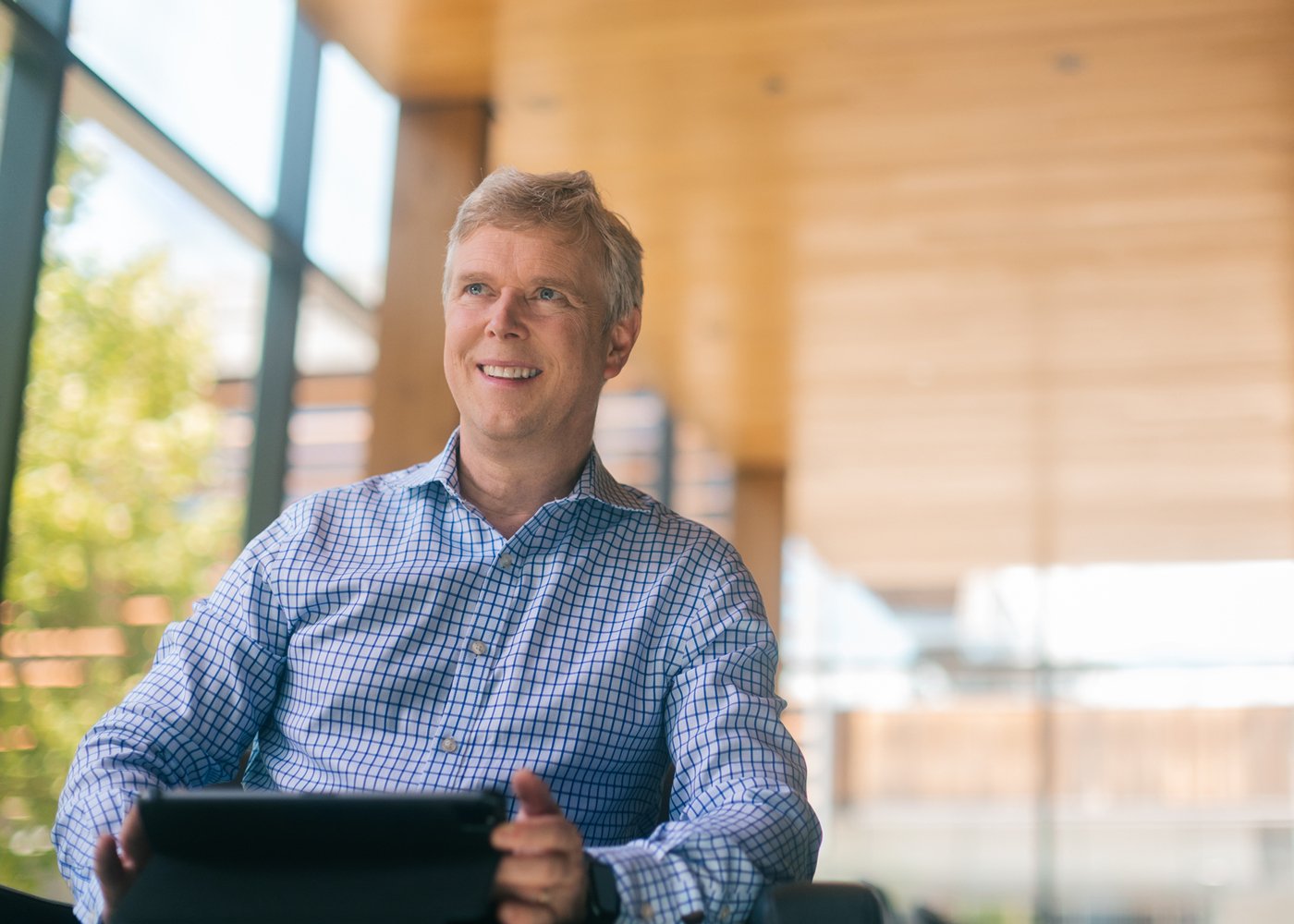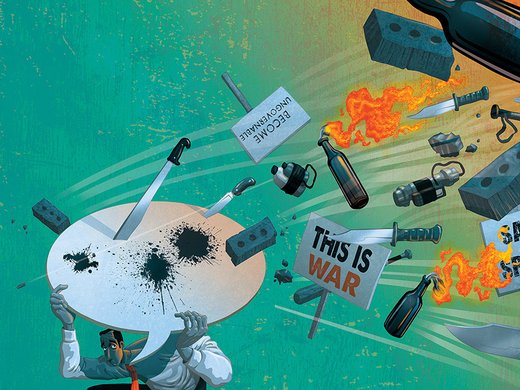It’s early July in Ottawa and one of Canada’s major cellular providers is suffering a catastrophic outage. Paul Samson is one among the many at a local café who are here for the Wi-Fi, not the coffee. For Samson, a lifelong student of the ways in which people can improve how they use technology to connect, communicate, innovate and trade, it’s an apt place to begin.
Samson, a long-time Canadian senior civil servant with deep experience in international relations, economics and governance, takes up his new role as president of CIGI on September 6. He arrives at a pivotal point for the Waterloo, Ontario–based think tank and the nexus of global issues that form its core areas of study.
Indeed, he says, there’s ample reason to believe 2022 will mark a major transition for the international order.
“People say it often, but some years are more volatile, and ripe for potential change than others, and this would be one of those,” Samson says. “But we don’t know how Ukraine and related events will play out in the next six months, and they will have a huge impact.
“We could be facing global food shortages, or even famine, this winter. Should that happen, it’s going to change the global agenda a lot,” he says. “CIGI needs to be nimble. We’ve already got a solid program, but I wouldn’t actually declare at this point what I’m going to drill into or what CIGI might add to its agenda. And I think that’s the right strategic call for a president coming in now.”
All of the world’s major institutions of multilateral governance, including the World Trade Organization (WTO), the International Monetary Fund (IMF), the World Bank, and even the United Nations itself, are in a state of flux, Samson notes. Nor have these institutions kept pace with the breakneck pace of innovation, whether in commerce, national security or trade.
“It’s not functioning,” Samson says bluntly. “You could say it hasn’t been functioning effectively for a while. In the past the United States drove the global framework. It’s more difficult now that China and Russia are willing to take strong lines in the opposite direction. India doesn’t want to narrow its options, nor do Brazil and South Africa. Saudi Arabia now has significant leverage, given its centrality to oil production. Already, you have a much more fragmented system. Can Humpty Dumpty put itself back together again? Certainly not in the same way.”
So, what will emerge? The only certainty, Samson says, is that the postwar rules-based order, broadly led by the United States and its allies, is under immense pressures of change. In the past, such transformations have only occurred when propelled by a seismic global event, such as a world war. It’s possible there will be a different kind of transition to a new order, this time. But he’s clear-eyed about the odds. “Something can flip smoothly, but that’s happened very rarely in history.”
Before Russia launched its full invasion of Ukraine, Samson had been thinking very much about a pivotal role for India, particularly given that it will be hosting the Group of Twenty (G20) leaders’ summit in 2023, and is the world’s most populous democracy, with one of its fastest-growing economies.
Samson also wonders if the wealthy democracies of the Group of Seven (G7) may carve out a new role amid the current uncertainty, or whether Brazil, Russia, India, China and South Africa — the so-called BRICS group — will manage to emerge as a more coherent bloc.
“There’s a bit of a myth that the BRIC countries are all in agreement, but they really don’t agree fundamentally on many things,” Samson says. “They occasionally get together and link arms. They don’t have an interest in preserving the status quo in any respect. So, what is the alternative? That’s where there is a really interesting discussion about what can emerge as a forum for common interests on global issues.”
Samson thinks that, given the fractures in the G20, those discussions may happen more at the sectoral level.
“That’s why digital is so interesting, because there may be more common ground there and ability to get away from some of the politics. Some coordination on global climate change shows there are common interests on specific issues.”
Samson credits growing up in British Columbia on Vancouver Island, at the edge of the vast Pacific Ocean and among its ancient forests, for sparking his lifelong interest in global affairs.
“After graduating from the University of British Columbia, I went to Geneva, partly because I wanted to see something different and experience the world a bit; get out of the bubble of BC,” he says.
While studying in Geneva, he deliberately chose an eclectic path.
“Normally a Ph.D. forces you to be very rigid,” Samson says. “The one that I did was with several profs — geography, political science, international law — and with an interdisciplinary social scientist working on climate change. What I was really drawn to at that time were issues that were truly global in nature. I was drawn very early to the question of climate change, back in the early ’90s. The 1992 Rio Conference was a huge inspiration for me.”
“We were really involved in how you integrate technology and policy and how organizations communicate through technology,” Samson says. “I’ve been thinking about these things for ages, and it’s always been part of what I’ve done.”
Samson was also contemplating global trade at the time, with the rise of the WTO. But he settled on global environmental change as his early focus, working with think tanks in Oslo, Norway; Washington, DC; and Geneva, Switzerland. These experiences eventually led to a move back to Canada, and a series of progressively more senior leadership roles in the civil service. As an executive in government, he sought out projects with global perspective and relevance. Given the accelerating international changes under way now, he says, this was a good time for him to move back to the think tank space.
Understanding how governments use advice from outside will be particularly valuable in his new role, Samson expects. “You can waste time on certain things that will be interesting but not impactful for decision makers,” he explains.
Having been hands-on with many different policy issues, Samson has often seen connection points to technology and digitization that are not initially obvious.
“CIGI already has a broad frame because it’s about governance — it’s not just a narrow tech conversation,” Samson says, noting that he has been engaged in technology discussions since his time in Geneva. “We were really involved in how you integrate technology and policy and how organizations communicate through technology. I’ve been thinking about these things for ages, and it’s always been part of what I’ve done.”
Samson notes that when he was involved in climate change negotiations, he led the technology transfer file. Digitization was a key part of the conversation when he was co-chair of the G20 Framework Working Group on the global economy. And in his most recent role at Agriculture and Agri-Food Canada, he served as champion for innovation and digital strategy.
Senator Peter Boehm, himself a former senior public servant with Global Affairs Canada, had high praise for his former colleague.
Boehm first met Samson in 2013 shortly after Boehm was named associate deputy minister of foreign affairs and when Samson was at the former Canadian International Development Agency heading the partnership branch, dealing with stakeholders and civil society organizations.
“What marks him uniquely for CIGI, and I think that he is an inspired choice, is that he gets the big picture stuff globally, in terms of international finance development assistance and innovation,” Boehm says. “But he also has a grassroots feel [for] civil society in terms of development policy and sustainable development. He’s the complete package.
“Plus, he’s personable, and was a great colleague to have,” Boehm adds.
Vidya ShankarNarayan, assistant deputy minister and chief information officer at Agriculture and Agri-Food Canada, says that innovation and inclusion are in Samson’s DNA.
“Paul was the digital and innovation champion so we would often brainstorm ideas to move the sector into the data-driven economy,” ShankarNarayan says. “Paul is an inspiring and trusted leader.”
Sebastian Barnes, a head of division in the economics department at the Organisation for Economic Co-operation and Development (OECD), worked with Samson for several years when Samson was co-chair of the G20 working group, tackling issues such as global economic imbalances, fiscal policy, structural reforms and the challenges of digitization.
“As co-chair, Paul led the group with great skill, patience and determination,” Barnes says. “This led to significant outcomes, including implementing the commitments of G20 countries in 2014 under the Australian G20 presidency to undertake hundreds of structural reforms and allow progress to be monitored by the IMF and the OECD. Together with his grasp of a huge range of interlocking policy issues and international experience, Paul’s ability to build a consensus and pragmatism are a valuable combination in the face of the global challenges we face.
“As we travelled the world together under successive G20 presidencies and sometimes went through some difficult meetings, it was always good to have Paul helping to keep the discussion on track,” Barnes adds.
It’s all the more critical, Samson says, that organizations such as CIGI stand ready to provide deeply grounded research, analysis and ideas that can help policy makers navigate this uncertainty and find a constructive path forward, with a global view.
Samson points out that among the consequences of the invasion of Ukraine has been that countries have focused on their narrowest national interests, whether it’s access to natural resources, food, energy or security.
In effect, the global peace and security paradigm has already been transformed, to a significant degree, he says. It’s all the more critical, then, that organizations such as CIGI stand ready to provide deeply grounded research, analysis and ideas that can help policy makers navigate this uncertainty and find a constructive path forward, with a global view.
As he looks forward to taking up his post, Samson plans to divide his time between Waterloo and Ottawa, where his family will continue to reside.



